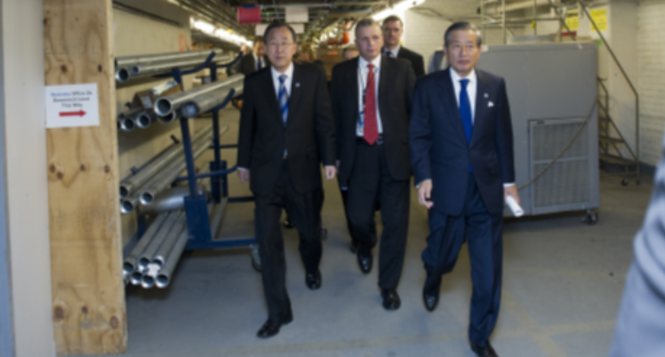
This year’s UN General Assembly Sixth Committee debate on the work of the International Law Commission on the protection of persons in the event of disasters was brought into unusual focus. Just days before the scheduled debate, the New York area was struck by a hurricane of historic proportion.
Hurricane Sandy struck the island of Manhattan and home of the UN headquarters overnight on Monday 29 October, bringing the city’s usual frenetic pace to a halt. UN staff and diplomats experienced first-hand the storms effects, including evacuation of the coastal areas, flooding, power outages, and the interruption of all transport links on and off the island. Damage was also sustained to the UN headquarters building. As Gregory Starr, Under-Secretary General for Safety and Security, was quoted as saying at a press conference the following Thursday, the Headquarters had suffered “major damage”, resulting in electrical problems and loss of some communications capabilities.
Perhaps due in part to this unfortunate backdrop, the topic received more attention than in previous years – including headlining the UN Department of Information summary of the debate on this cluster.
Before the Sixth Committee this year were five new draft articles provisionally adopted by the Commission’s drafting committee:
- Article 5 bis Forms of cooperation
- Article 12 Offer of assistance
- Article 13 Conditions on the provision of external assistance
- Article 14 Facilitation of external assistance
- Article 15 Termination of external assistance
Representatives of thirty-six state and observer missions took the floor to comment on this text as well as the Commission’s work on this topic more broadly.
Interventions focused on familiar themes, including state sovereignty and the primary responsibility of the affected state. The Russian Federation characterised the need to strike a balance between these generally-accepted principles and the need to provide adequate assistance to victims as the central issue for the Commission on this topic. Addressing this need for balance, Japan argued that “the affected state should be able to maintain overall control of the assistance it receives and ensure compliance of domestic laws, but domestic procedures should not impede the facilitation of external assistance.”
Another key theme of the debate was the right of a state to refuse or place conditions on international assistance. Several states, including the United Kingdom and Pakistan, called for an explicit reference in the draft articles to the right of a state to refuse assistance. Others, including the Netherlands and Indonesia, argued that any conditions placed on incoming assistance should reflect the needs of people affected by the disaster. A balanced provision, the representative from the Netherlands said, “would allow for the refusal of aid that is not in conformity with accepted principles of humanitarian assistance, while avoiding arbitrary refusal of urgently needed aid.”
Finally, a number of states also expressed their views on the eventual form of instrument they would like to see resulting from the Commission’s work – with many voicing their preference for a set of guidelines or framework principles. As the IFRC cautioned in previous Sixth Committee debates on this topic, such an approach risks duplicating existing instruments of a similar nature, such as the Guidelines for the domestic facilitation and regulation of international disaster relief and initial recovery assistance (IDRL Guidelines) already adopted by states at the 30th International Conference of the Red Cross and Red Crescent. This risk could, however, be partially addressed by more active consultation by the Commission with actors involved operation aspects of disaster response, including IFRC, the UN Office for the Coordination of Humanitarian Affairs (OCHA) and the International Search and Rescue Advisory Group (INSARAG) network – as suggested by Switzerland.
The full text of the IFRC’s statement in the debate is available here, and the analytical guide to the Commission’s work on this topic, including all reports by the Commission and the Special Rapporteur as well as the text of all draft articles, is available here.